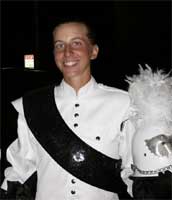It's amazing how often drum corps parallels real life. Over the past few weeks, I've become one of the most trusted employees at work. One manager trusts me with his personal and professional problems, while another trusts me to do all sorts of paperwork, and the owner, the head honcho, trusts me with the restaurant's recipes. I've become their "go-to" person -- if anything needs to get done, they send it my way. I guess hard work and dedication really can get you somewhere.


Lanah Kopplin


